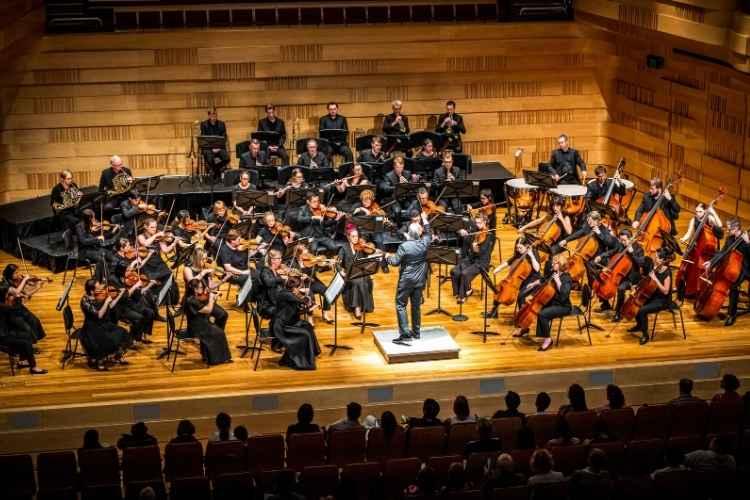At 'Maestro', music-lovers can experience Mahler's awe-inspiring First Symphony, presented by Dr Nicholas Milton AM and the Willoughby Symphony Orchestra.
Gustav Mahler, best known for his vast, breathtaking symphonies, was the leading conductor of his generation. Audiences can look forward to a night of marvelling at the virtuosity of the orchestra, as they present one of the most exciting works in the repertoire.
Plus, opening the concert will be Latvian composer Pēteris Vasks' Cello Concerto No.2, 'Presence'. . . With celebrated Australian cellist Julian Smiles.
Here, we speak to Julian about the programme and what audiences can expect.
You’re opening the concert with Pēteris Vasks’ ‘Presence’ – what was your first impression of this piece when you encountered it, and what do you hope audiences will take away from hearing it live?
I had come across several pieces by Vasks previously, and always been incredibly moved by the way he can take the listener beyond the constraints of the physical world. This Concerto was suggested to me for a festival a number of years ago, and I knew immediately that I would love playing it, even though I was somewhat daunted by having to sing and play at the same time towards the end. Vasks’ music has a unique and beautiful sound, and I hope the audiences will be truly transported by this beautiful piece.
The concerto is inspired by 'the soul ascending into the cosmos'. Do you feel that sense of transcendence when you’re playing it, or are you focused more on the technical challenge in the moment?
There are many great works of the cello repertoire where it is important to 'stay in control' when in the performance space. While it’s certainly necessary to put a lot of focus into the 'logistics' side of playing this piece by Vasks, being emotionally carried away by its nature and beauty is actually important in a meditative sense.
How does Vasks use the cello to capture emotion differently from other composers you’ve worked with?
Vasks has an incredible ability to take string instruments 'beyond the world' – he uses sounds which drift into space, and there is very often a feeling within his music of reaching upwards. He also contrasts this with earthy, powerful language which has a strong folk music feel.
Audiences are also getting Mahler’s epic Symphony No.1 on the programme. How do you think Vasks’ concerto and Mahler’s symphony speak to one another across the same night?
The Mahler has an exquisite beginning – high strings creating an ethereal world where the sun gradually rises and the music arrives. Perhaps this could be listened to as the 'Birth Of The World'. The Vasks on the other hand represents the birth of a single soul, its progress through life, and ultimate journey to another plane. Smaller scale, but equally profound and no less beautiful.

When you’re listening to this music from within the orchestra, do you experience it differently from how you might as an audience member?
Music always sounds different from within an orchestra, or string quartet, or even playing a single instrument. I often wish I could bring the audiences' ears into where I sit, to experience the richness of sound, its power, and the interactions between sounds of different instruments. Our job is to project that out into the hall as much as possible.
When you’re preparing for a performance of something like ‘Presence,’ what’s your balance between disciplined practise and just sitting with the music and letting it sink in?
Heavily towards the 'disciplined practise'. In any performance I want to be as well prepared as possible so I can bring the message of the composer, and my interpretation of it, across to the audience. Hopefully when it comes to the rehearsals and performance I can fully engage with and treasure the beauty of such music.
Has your relationship with your cello changed over the years – does it feel like an extension of you now, or are you always finding new aspects of it?
A bit of both. I have been playing the cello for almost 50 years now, and really feel that I project my voice through the instrument. However, one of the beauties of playing a musical instrument is that even after 50 years you can find new and better ways of doing something – I find this particularly in my role as a teacher. It’s actually a bit annoying at times: “why didn’t I think of that 40 years ago?”.
What moments of this programme are you most excited for the audience to experience?
As far as the Mahler is concerned, the end is a stunning and heroic culmination. It was the first Mahler Symphony I ever played in, and it’ll blow everyone’s heads off. The Vasks is a sound world and message that I am particularly passionate about - I find it incredibly moving to play, and treasure the opportunity to introduce it to people.
If someone’s new to symphonic music and maybe feeling a little daunted by Mahler or Vasks, what would you tell them about this programme that might put them at ease and get them excited for the event?
Daunted? Don’t be. Open your ears and your hearts – this music will sweep you along, and take you to places you never knew existed. If we do our jobs right you will talk about the moment you first heard these pieces for the rest of your lives.
Willoughby Symphony Orchestra present 'Maestro' on 18 October at The Concourse Chatswood.






